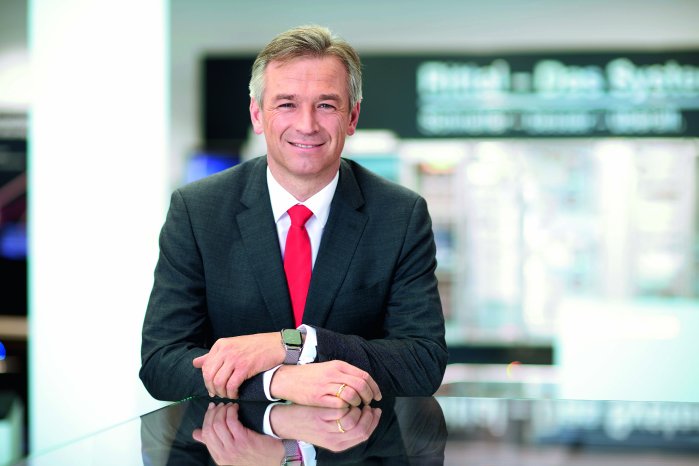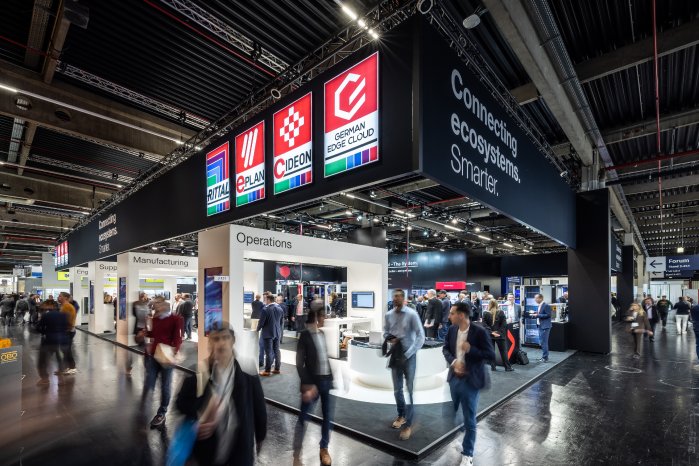“The digital transformation of factories, a secure and economically viable long-term energy supply, and the establishing, measuring and reduction of industrial products’ carbon footprints are major challenges that cannot be solved in isolation,” says Markus Asch, CEO of Rittal International and Rittal Software Systems: “Innovation that goes beyond products and solutions is needed. We need to understand the various processes surrounding our customers’ value chains, consider new ecosystems and develop overarching solutions. We are convinced that this is only possible via standardisation. The Hanover Fair is the forum for industry-wide dialogue on this subject.”
Digital twins for smart production and power management
One thing is clear, industrial companies are moving towards smart production – economic production with highly automated and efficient processes is required. At the same time, this must be managed in an energy-efficient way, and with flexible solutions that can be adapted to individual customer needs. And all this against the backdrop of a shortage of skilled workers. “Nowadays, real and genuine innovation simply just means making the customer’s overall performance more efficient and successful,” Mr. Asch says: “If we no longer think in terms of products and solutions, but rather in terms of process optimisation, we can only do so by cleverly combining both hardware and software.”
As enablers of smart production, Rittal, Eplan, Cideon and German Edge Cloud will be demonstrating at the trade fair how, in the future, it will be possible to connect the three ecosystems of automation design and engineering, product manufacturing and manufacturing processes via one respective digital twin. This will make smart production processes more transparent and efficient. Energy flows also become more transparent and can thus be optimised, a critical success factor for industrial companies, both today and in the future. Prerequisite for this: complete transparency along the customers’ value chains, from panel building and switchgear manufacturing to the operator.
How? Eplan and Rittal are working with control, switchgear and mechanical engineering companies to speed up the development of the automation twin and to make the data more usable during operation. Cideon is improving data continuity and consistency in the digital product twin context with its CAD/CAM, PDM/PLM and product configuration expertise. The ONCITE Digital Production System is the platform for the Digital Manufacturing Twin and IIoT-based production management.
Live insight into the running factory from the trade fair
Visitors can see how this works in practice – live and in almost real-time – at the companies’ joint booth. In Rittal's smart enclosure factory in Haiger, energy monitoring has already been integrated into the ONCITE DPS digital production system; a live insight is provided – via the cloud – from the trade fair into the actual energy data of the ongoing production. The energy flows of the associated data centre can also be seen. The RiZone OTM Suite presented at the trade show is showcasing how to manage data centre operating technology. Here, Rittal will be using what its sister company German Edge Cloud has developed and offers to customers: The new Rittal software is based on the ONCITE DPS’s flexible microservices architecture.
More speed to develop the energy infrastructure
But it is not only manufacturing that faces the challenge of monitoring and managing energy differently in the future. The entire energy sector is also under tremendous pressure to act and cut costs. The expansion of this infrastructure must pick up speed to meet industry requirements. One thing is clear for Eplan and Rittal: The critical factor is the industrialisation of the entire process chain, combining both software and hardware.
“Modularisation, standardisation and data consistency are our driving principles,” explains Markus Asch: “Rittal’s and Eplan’s experience with our customers from the control, switchgear and mechanical engineering sectors has shown that there is considerable potential for optimising and industrialising process chains. Furthermore, end-to-end hardware and software solutions increase the pace of infrastructure expansion – from energy generation and storage to grid expansion and sector coupling to charging facilities for electric vehicles. The efficiency gain reduces costs, while the data, as the automation twin, opens up further possibilities for use in operation.”
New base solutions, platform updates and enclosures
This all requires swift action and solutions which is why Eplan and Rittal are tackling this at the Hanover Fair using the new “Base Solutions”. With many customer projects successfully completed, the two companies have jointly created “Best Practice Templates,” like, for example with the planning and implementation of charging parks for e-mobility vehicles. This speeds up the project via data-consistent standards and modules. The new Eplan Platform 2024 also further simplifies design and engineering. And, furthermore: Rittal is also presenting a new plastic AX enclosure, with EX approval, for potentially explosive areas of the infrastructure, for example, around liquid natural gas (LNG) or hydrogen.
About Rittal
Rittal, headquartered in Herborn, Germany, is a leading global provider of solutions for industrial enclosures, power distribution, climate control and IT infrastructure, as well as software and services. Systems made by Rittal are deployed in over 90 per cent of all industries across the world, including machine building and plant engineering, food and beverage, and IT and telecommunications.
The international market leader’s product portfolio includes configurable enclosures, with data available across the entire production process. Smart Rittal cooling systems, with up to 75 per cent lower energy consumption and greater CO2 benefits can seamlessly communicate with production infrastructure, enabling predictive maintenance and servicing. The range also includes innovative IT products, from IT racks and modular data centres, to edge and hyperscale computing solutions.
Leading software providers Eplan and Cideon further add value by providing cross-discipline design and engineering services, while Rittal Automation Systems offers solutions for switchgear. Within Germany, Rittal can supply products on demand within 24 hours – accurately, flexibly and efficiently.
Founded in 1961, Rittal is the largest company in the owner-operated Friedhelm Loh Group. The Friedhelm Loh Group is active worldwide, with 12 production sites and 95 international subsidiaries. It has more than 12,000 employees and posted revenues of € 3 billion in fiscal 2022. In 2022, the family-run business was named one of Germany’s leading employers by the Top Employers Institute, for the 14th year running. Within the scope of a Germany-wide survey, Focus Money magazine identified the Friedhelm Loh Group as one of the nation's best providers of vocational training for the fifth time in 2021. In 2022, Rittal was awarded the Top 100 Seal as one of Germany’s most innovative medium-sized companies.
For more information, visit www.rittal.com and www.friedhelm-loh-group.com.
Founded in 1961, Rittal is the largest company in the owner-operated Friedhelm Loh Group. The Friedhelm Loh Group is active worldwide, with 12 production sites and 95 international subsidiaries. It has more than 12,000 employees and posted revenues of € 3 billion in fiscal 2022. In 2022, the family-run business was named one of Germany’s leading employers by the Top Employers Institute, for the 14th year running. Within the scope of a Germany-wide survey, Focus Money magazine identified the Friedhelm Loh Group as one of the nation's best providers of vocational training for the fifth time in 2021. In 2022, Rittal was awarded the Top 100 Seal as one of Germany’s most innovative medium-sized companies.
About CIDEON
CIDEON advises and supports companies in optimizing their product development processes – from designing through engineering to production and service. As a system integrator and process consultant, CIDEON knows and understands the challenges faced by companies when it comes to digital transformation. With unique solutions, CIDEON ensures a consistent flow of data along the process chains, making data available company-wide and in an economically usable way. This means that CIDEON customers can exploit the full potential of digitisation for themselves and their customers.
CIDEON uses the latest software solutions from the CAD/CAM and PDM/PLM sectors, along with software developed in-house. CIDEON is an Autodesk Platinum Partner in German-speaking Europe, an SAP Platinum Build Partner, as well as a software partner of Dassault Systèmes and PROCAD. CIDEON, which has over 300 employees at 12 locations in Germany and Austria, is also part of the Friedhelm Loh Group. The family business is active worldwide, with 12 production sites and 95 subsidiaries all over the world. The corporate group includes Rittal, Eplan, Stahlo and LKH.
For more information, visit www.cideon.de and www.friedhelm-loh-group.com.
About German Edge Cloud
German Edge Cloud (GEC), a member of the Friedhelm Loh Group, specialises in innovative edge and cloud computing. GEC solutions enable the rapid, simple and secure availability of data in connected environments. They support process optimisation, for instance in manufacturing, by empowering data analytics, and guaranteeing customers complete control over their data when using public or private clouds.
GEC is a developer and service integrator for turnkey solutions, offering both its own and sector-specific systems. The company already deploys its solutions at the Industry 4.0 factory of sister company Rittal in Haiger.
GEC integrates and operates hybrid private edge cloud infrastructures from Infrastructure as a Service (IaaS) to Platform as a Service (PaaS) and industry-specific applications in the Software as a Service (SaaS) model. It is a co-founder of GAIA-X and a member of the Catena-X automotive initiative.
GEC is a member of the owner-operated Friedhelm Loh Group. The group is active worldwide, with 12 production sites and more than 95 international subsidiaries. It has approximately 12,000 employees and posted revenues of €3 billion in fiscal 2022.
For more information, visit www.gec.io and www.friedhelm-loh-group.com.
For more information, visit www.rittal.com and www.friedhelm-loh-group.com.




